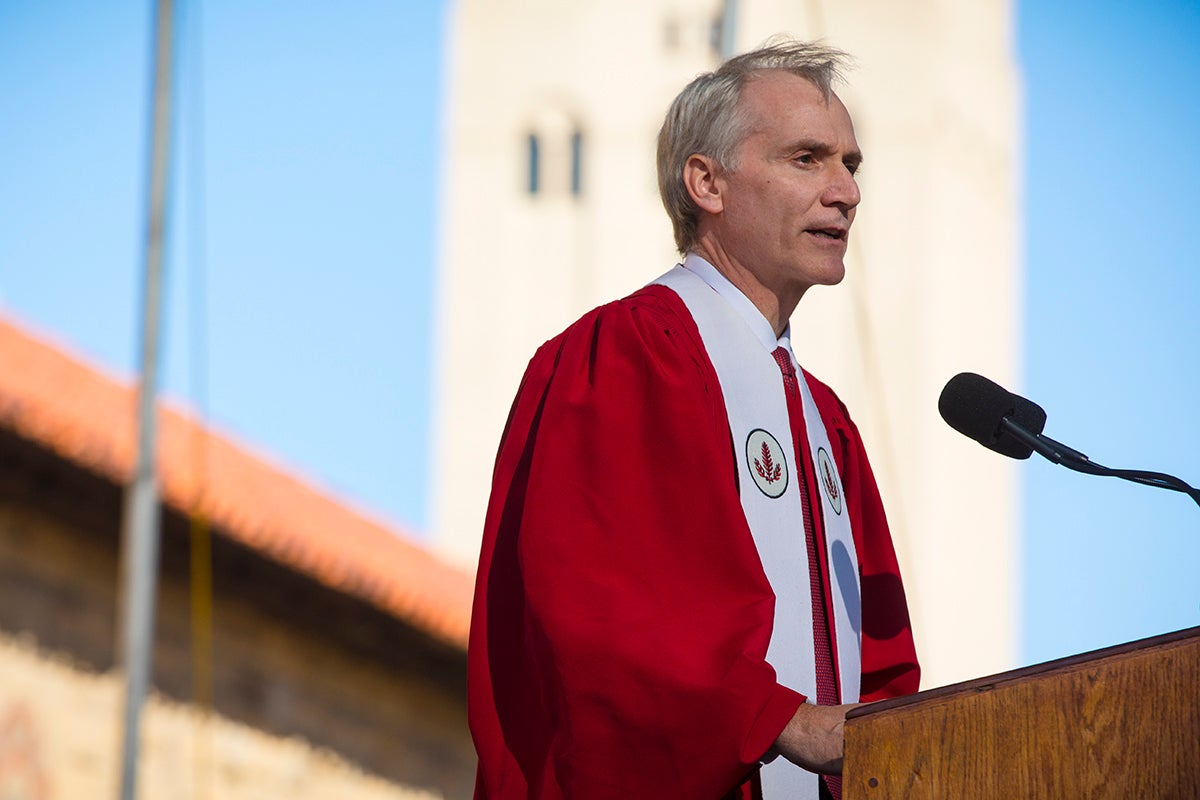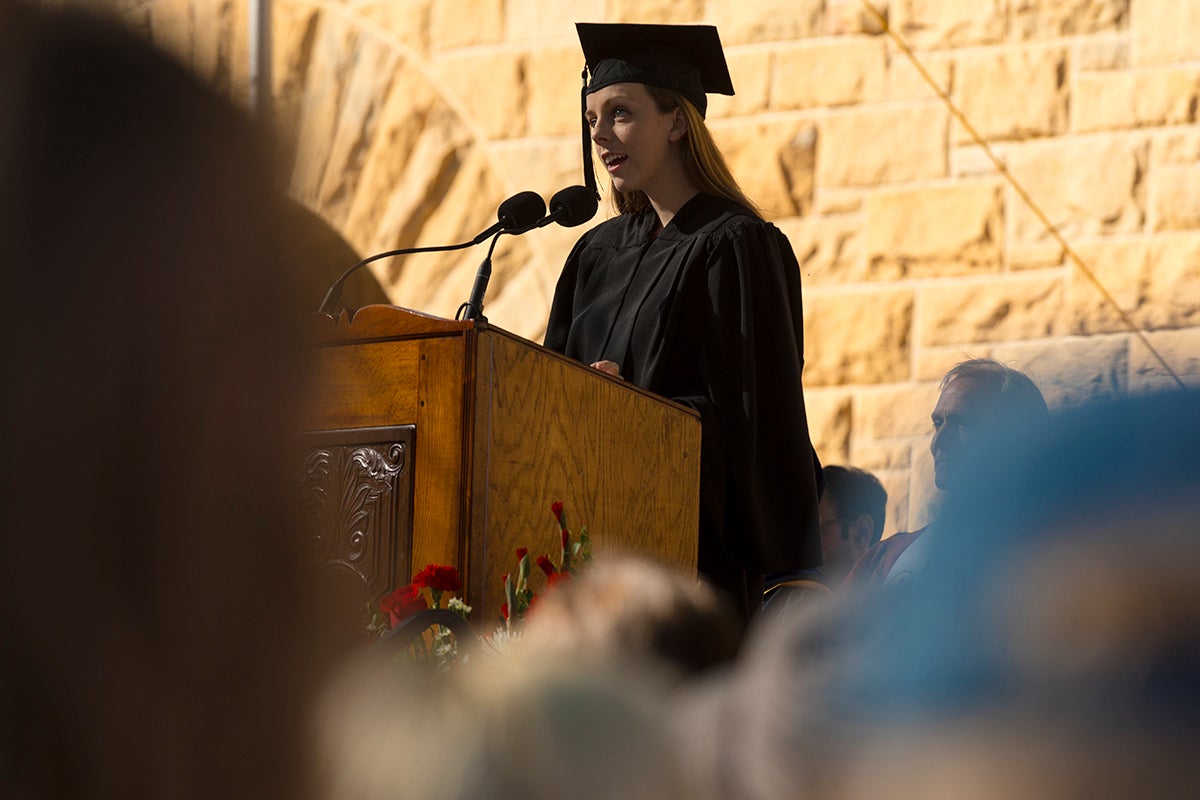At the 127th Opening Convocation Ceremony held on Tuesday in the Inner Quad Courtyard, Stanford President Marc Tessier-Lavigne urged new students to commit themselves to the university’s values of diversity, inclusion and free expression, and to do their part to make Stanford a community that fosters belonging for all its members.
“Throughout the university, we know that our strength comes from the diversity of our community, and our culture of inclusion of people of all backgrounds, nationalities, races, genders, identities, religions, political views and ways of thinking,” Tessier-Lavigne said.

Stanford President Marc Tessier-Lavigne speaking at Opening Convocation Ceremony. (Image credit: Aaron Kehoe)
“A thriving academic community depends on the free and open exchange of ideas in a culture of mutual respect, even – and especially – if the ideas and perspectives of others don’t square with our own. We learn by being exposed to new perspectives, by having our ideas challenged, by being forced to sharpen our arguments.”
He said it was essential that everyone in the Stanford community rededicate themselves to its foundational values, “especially after a summer in which we witnessed violent displays of intolerance, bigotry and hatred in our country and throughout the world.”
Tessier-Lavigne said the foremost message he wanted to convey to students was that they belong at Stanford, whether they were the first person in their family to go to college or one of many family members to pursue a college education.
“Whether you were born in the United States, or in another special place somewhere around the world,” he continued. “Whether you are strongly committed to an identity, a group, a faith, a talent, an activity, a political party, a life philosophy – something important, something near and dear to you – or whether you are still figuring out a lot of those things, I want all of you to know: you belong here. This includes our students enrolled in the DACA program, who are with us today. We want you to know that we will continue to push for a legislative solution to protect you and all our country’s DREAMers. You belong here and we stand by you.”
Tessier-Lavigne was one of several speakers who welcomed new students and their families and friends to Stanford during Convocation, which inaugurates the new academic year. The ceremony also featured Alexis Kallen, a senior majoring in political science and in feminist, gender and sexuality studies; Richard H. Shaw, dean of admission and financial aid; and Harry J. Elam Jr., vice provost for undergraduate education.
Three challenges offered
In his address, Tessier-Lavigne talked about his own academic path. He recalled deciding to become a physicist on his first day of college – until an introductory philosophy class caught his eye.
“Out of curiosity, I decided to take the class, and then I took another and another,” he said. “Philosophy taught me how to think, which also taught me how to lead. I use the concepts of logic and reasoning every day as a scientist and as a leader.”
Tessier-Lavigne said a chance exposure to biology in a biophysics class also piqued his curiosity. That interest led to a deeper focus on biology, to neuroscience research, to academia, and to a biotech company, where he developed drugs to treat deadly diseases.
“So my day one plan to become a physicist evolved dramatically as I explored and found my true calling,” he said. “Based on my experience, I therefore hope that, beyond getting deep knowledge in the area of concentration you select – in your major – you will also expose yourself broadly to what Stanford has to offer.”
Go to the web site to view the video.
He encouraged new students to visit the Cantor Arts Center, and “think about what art can teach you about computer science, engineering and economics, and think about what machine learning can teach you about art.” To join a club, play intramural sports, or start a podcast, and “to explore how virtual reality is being used to build resilience.” To learn how 3D printing is changing scientific discovery, engineering and the arts. To study literature and philosophy to learn how to strengthen their arguments, and to learn about themselves and what they truly believe.
“As you decide what to focus on, be open to falling in love with the unexpected – new areas of knowledge and paths to discovery,” he said.
Tessier-Lavigne challenged students to “be of service to the world” by embracing community involvement through Cardinal Service, a university-wide initiative to elevate and expand service as a distinctive feature of a Stanford education.
He also challenged students to “be true to the best you know” through their integrity and courage in their personal and academic choices.
“Being true to the best you know means taking care of yourself and taking care of others,” Tessier-Lavigne said. “Respecting yourself and respecting others. Respecting your body and respecting the bodies of others. Holding yourself and one another accountable for preventing sexual violence. Being true to the best you know also means being a good friend. And one of the most important tools to achieve that is empathy. Through giving and receiving empathy we are able to experience the meaningful connections and mutual understand we all seek in our lives.”
“Stanford is made for you”
Looking back at her arrival at Stanford three years ago, student Alexis Kallen said she had feared that she would be “seen as lesser,” due to her speech and movement limitations, her family situation – her father was homeless – and her financial limitations.

Senior Alexis Kallen gave the student talk during the Opening Convocation Ceremony (Image credit: Aaron Kehoe)
“However, my fears quickly subsided,” she said. “The awkward dining hall conversations during New Student Orientation turned into late night talks sitting around in dorm hallways surrounded by buckets of mozzarella sticks. Wherever I turned, people were eager to talk about solving some of the world’s deepest issues, as well as those who wanted to talk about the latest episode of Gossip Girl.”
Kallen said she soon learned that Stanford’s tight-knit community included members of the faculty as well.
“During my first few days, I met Dr. Luci Herman, a law school lecturer who doubled as my resident fellow,” she said. “Our casual conversations in the lounge quickly transformed into lengthy talks on foreign policy and women’s rights. As I dove into my academic journey she guided my studies, advised me on my on-campus pursuits, and eventually Skyped me daily when I pursued independent research in Rwanda – even though she would never approve of me riding on the back of motor scooters to get around Kigali – no matter how many helmets I wore.”
Kallen said her once tearful calls home to her father quickly faded into exciting conversations about the new ideas and relationships she had built through one-on-one discussions with faculty and friends.
“No matter where you come from, Stanford is made for you,” Kallen said. “You will find a community here each step of the way to support and teach you. There were times at Stanford when I felt challenged, yet it is in those moments that I learned to lean on the many communities and individual relationships that I have formed here. Stanford has allowed me to empower myself and raise my voice in ways that I never thought possible and I know it will do the same for all of you.”
Welcome to independence
Richard H. Shaw, dean of admission and financial aid, welcomed the 1,703 first-year students and 27 transfer students, a cohort that includes 13 U.S. military veterans, saying: “Now is the time and this is the place for a new chapter in your life. Welcome to independence.”
Those new students hail from 48 states – “Blast you Vermont and West Virginia,” Shaw said – and from 60 countries.
“Eleven percent of you hold international citizenship and you come from 1,220 high schools from around the world,” he said. “You speak 44 different languages.”
Within the Class of 2021, 17 percent of the students are the first members of their families to attend a four-year college.
“What is most stunning about the class is that you have shown incredible potential to embrace a Stanford education,” Shaw said. “Indeed, you come from a range of school types, cultures, religions, ethnicities, and socioeconomic backgrounds, and you bring broad and deep national and international perspectives. This diversity is a hallmark of Stanford.”
He said more than 100 new students come from states and countries that have been devastated in recent weeks by hurricanes, plus several students affected by the earlier earthquake in Mexico.
“We offer our support to those who are here today,” Shaw said. “Continuing undergraduates will join you soon, from your hometowns. You will be our models for resilience as your families rebuild.”
As a whole, the class of incoming students is characterized by heart and compassion.
“You are acutely aware of the challenges of this world, and you are committed to taking care of those around you,” Shaw said, adding that with freedom and independence comes the awesome opportunity to live in service to humanity.
“In your time at Stanford you may go out into the world as part of Cardinal Service, or you may apply your skills and talents to research tackling the world’s most complex problems, or you may become a student staff member in order to support your fellow students,” he said. “Whatever it is, we know you stand ready to give, ready to act and ready to serve.”
Step boldly into your tomorrow
Harry J. Elam Jr., vice provost for undergraduate education, told the audience that Stanford offers all of its students community and support, opportunity and acceptance – regardless of their beliefs, their backgrounds or their immigration status.
“Stanford’s history and unique culture have embraced the uncommon, uncertain route, the less predictable trail, for we are different,” he said. “We encourage the unconventional, those mental bends that can turn you in remarkable new directions.”
Elam said Stanford remains committed to the spirit of reinvention, the dedication to discovery, the inclination to inspired risk present at its inception.
“On this journey, you will find that Stanford is truly a distinctive incubator of infinite possibilities, a wondrous intellectual playground built for you,” he said.
Addressing the parents, families and friends in the audience, Elam said it can be hard to say goodbye to a student leaving home for college, but he sought to ease some of their concerns.
“Here, students will be pushed, but appreciated,” he said. “They will face exceptional academic challenges, but also find unprecedented encouragement. They will come to know new worlds, but also come into new knowledge of themselves.”
Addressing the new students, Elam said they were embarking on a journey that would have twists and turns and starts and stops – but was always worth the taking.
“New students, please know that, starting today, you will have the occasion to step boldly out into your tomorrow,” he said. “Know that this journey will have twists and turns and starts and stops. Know that, at this time when the world seems to be at a major inflection point – when change in one direction or another is inevitable – Stanford offers you an opportunity to become a part of something powerful that is at once intimate enough to be particular to you, and at the same time capacious enough to embrace the intellectual dreams of this entire community. Rest assured, students, Stanford will change you. And also recognize that, you, in turn will change all of us.”